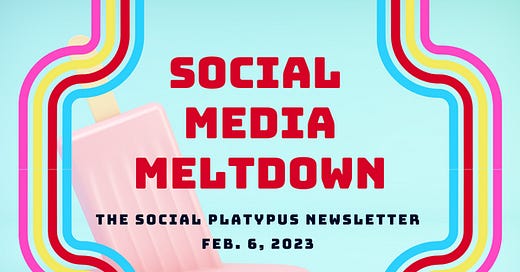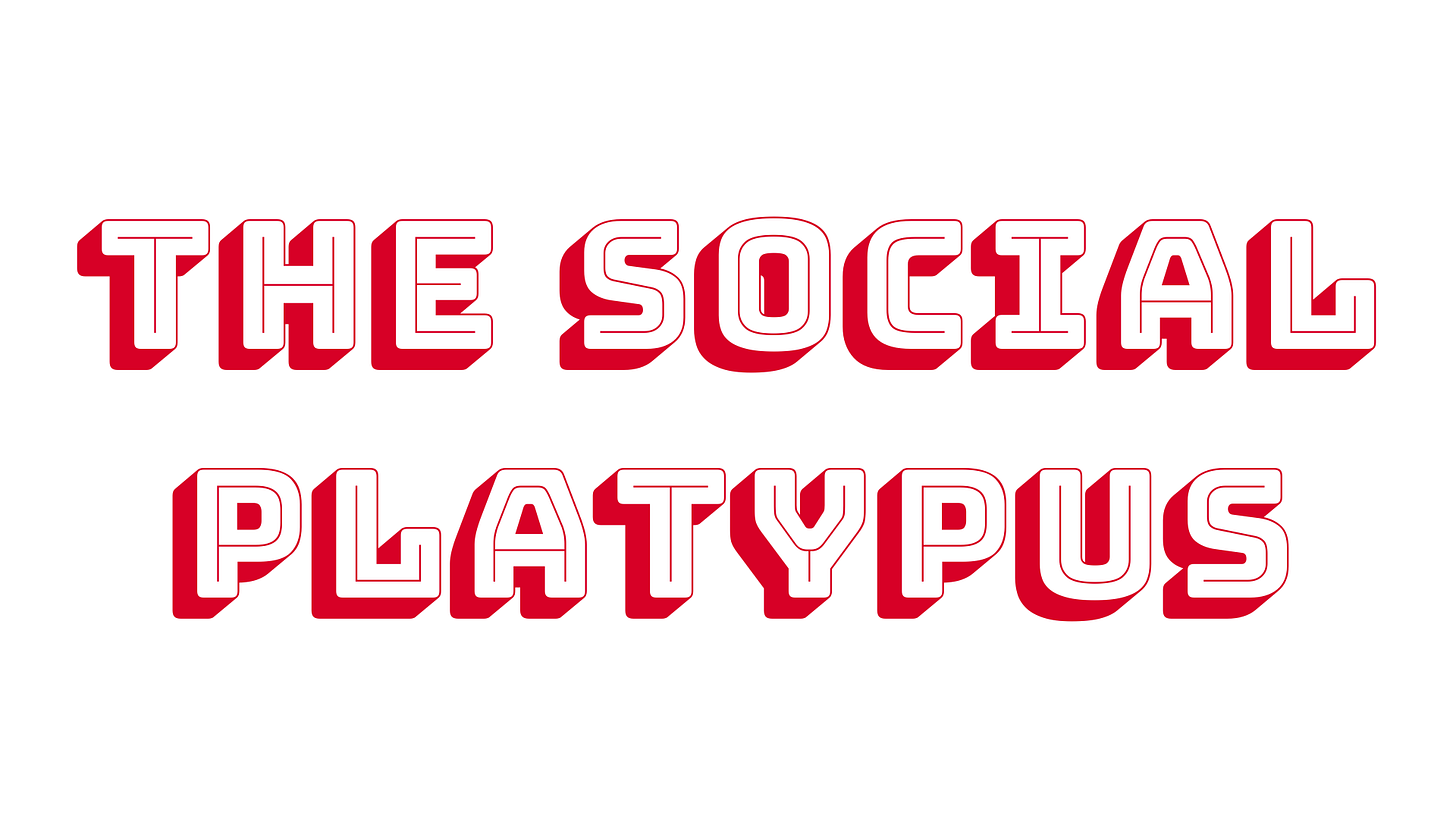Anyone else going to watch Google’s Feb. 8th event? Rumours suggest the company might be preparing to announce a ChatGPT competitor. Here’s what the Live from Paris event description on YouTube says: “We're reimagining how people search for, explore and interact with information, making it more natural and intuitive than ever before to find what you need.” In related news, ChatGPT is the fastest-growing app in history (nbd 🤷♀️).
In today’s newsletter:
Meltdown: The three types of social media crises you’ll face
Can the Instagram co-founders do it again?
YouTube: How viewership is changing
Remembering the Harlem Shake
MELTDOWN
Several brands have taken a rep hit over the last 12 months — from Lisa LaFlamme’s 2022 ouster from CTV News that sparked a backlash online, to a more recent PR crisis for @mmschocolate over it’s apparent decision to sideline its “spokescandies” over criticism about changes to the look of M&M’s (although, their crisis may have been part of a Super Bowl ad stunt; we’ll find out next week).
In my 10+ years as a social media manager, I’ve faced social media crises of all sizes, including one that lasted 1.5 years and hit headlines around the world. But I’m not unique. Every social media manager will face this in their career. For those of you who may still be new to this, I thought I would talk about three types of social media crises you may come up against, and how to manage them. Here we go 😬
1/3 The misdiagnosed crisis
There is still a lot of misunderstanding out there about what social media is and is not, how it works, and how online communities work in general. For this reason, you need to be prepared for what I like to call “the misdiagnosed crisis.” Here are some examples:
Wrong information on a Wikipedia page
A YouTube video posted by someone else that somehow is linked to your brand or mentions your brand
Regular critical comments in response to social media posts
Sure, you’d prefer if there wasn’t wrong information on Wikipedia, and that everyone loved your brand. But as you know, you don’t control the entire internet, or what other people post. You certainly can’t take down someone else’s YouTube video, and brands can’t control Wikipedia pages.
What to do: It’s not going to be easy, but you’re going to have to embark on an education campaign. Depending on the issue, you’ll have to put together information and research to help higher ups understand what is and what isn’t within your control. But more importantly, you need to explain what the implications are to the brand. Because if you go around deleting critical comments, you may just get a real social media crisis on your hands.
2/3 The chronic crisis
Does your brand have a troll that regularly likes to attack you online in both subtle and overt ways? Or perhaps you once had an issue, and it keeps bubbling up when there are triggers, like anniversaries. Or maybe the issue itself is chronic (for example, dealing with COVID) and outside of your control.
While these don’t really impact your company’s brand in an irreparable way, they can be a pain to deal with.
What to do: For trolls, screen grab and respond as necessary (and stay on message). For that crisis that keeps bubbling up, your response is really on a case-by-case basis. If the comments aren’t racist, homophobic, or threatening, you can probably just let them pass. For those that go beyond the regular rant, you can report accounts. You can also hold comments for review, hide comments on Facebook, and activate profanity filters. But use all of these with great caution! And NEVER indiscriminately delete comments. You’ll have a censorship issue on your hands.
3/3 The acute crisis
While these are occasionally prompted by something that is posted on social media (who remembers the DiGiornio #WhyIStayed debacle?), most often it’s the result of actions or incidents that happen offline.
Perhaps your company made a poor decision — or at least one that it’s being criticized for. You may also be asked to respond to things your current or previous employees do (at the university I used to work at, we had to post a response on social media after an alumnus yelled profanities at an on-air reporter).
Regardless of how it started, if you’ve had that sinking feeling as a social media manager, please know you’re not alone.
What to do: There are stages to a crisis, and the response is different at every stage. In the immediate aftermath, it’s important to act quickly, to apologize (on video if necessary) and outline the steps the organization is going to do to rectify things. Note: This is actually quite hard to do, because if your organization hasn’t been through a crisis like this before, the leaders may not understand the urgency and need for a response. You may have some convincing to do. If you don’t respond quickly — and to the satisfaction of your online community — then you go onto the next stage of just trying to manage the conversation online for the next few weeks, or months. And then it will likely enter the third stage, where it becomes chronic.
Do’s and Don’ts
Do a risk management assessment and identify issues that may bubble up on social media so you can prepare messaging in advance
Create social media guidelines that clearly state the types of comments that are unacceptable, and outline the actions that your organization will take
Never pretend your account was hacked (people know you’re lying)
Don’t try to resolve the issue online; always push it offline if possible by providing an email address where the conversation can continue
If you’re the social media manager dealing with the crisis, for your own mental health take time off after an acute crisis to decompress
Good luck out there! Always happy to chat if anyone needs support: hello@thesocialplatypus.com.
SOCIAL SNACKS
1/2 Can the Instagram co-founders do it again?
The co-founders of Instagram, Kevin Systrom and Mike Krieger, are working on a new app called Artifact. It’s described as “a personalized news feed driven by artificial intelligence” (like TikTok for news?). According to an article by The Verge, beta users are testing a feed showing articles posted by people they follow. There is also a direct message box where you can discuss the articles with friends. If you’re curious, a waitlist is available. You can sign up here.
2/2 YouTube: Viewership is changing
These are the three viewing trends, according to YouTube:
Creator-driven content is taking over TV and YouTube is leading streaming watch time, according to a recent Nielsen Gauge Report.
Short-form content is expected to become even more popular; it works well with long-form content, says YouTube
And Gen Z say they value story and relevance over everything, and they like content that is personally relevant to them.
ICYMI
Instagram experiments with lead forms as CTA button option on business profiles [Social Media Today]
Twitter will kill off free API access [Mashable]; Elon Musk wants to charge businesses on Twitter $1,000 per month to retain verified check-marks [Variety]
Meta’s shares surge nearly 20% as Zuckerberg pledges to make 2023 a ‘year of efficiency’ [CNN]
TikTok announces an updated account enforcement system [TikTok Blog]
Snapchat+ passes 2 million subscribers [Snapchat Blog]
IT WAS 10 YEARS AGO…
That the Harlem Shake internet meme came out. In case you don’t remember, groups of people would flail around to the song “Harlem Shake” and they were usually dressed in a weird costume. Those times seem so quaint now, lol. I found the one that happened while I was social media manager at Wilfrid Laurier University. Enjoy.





